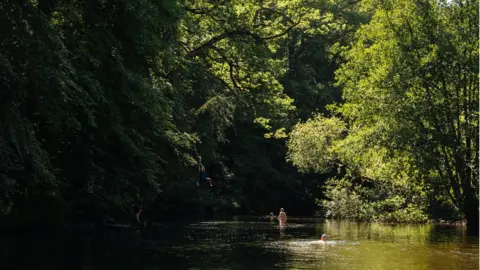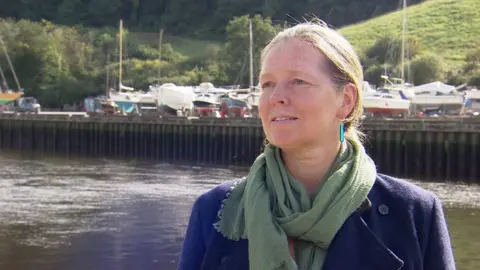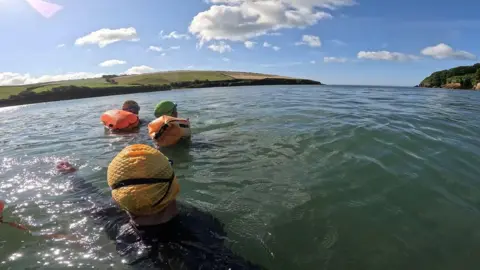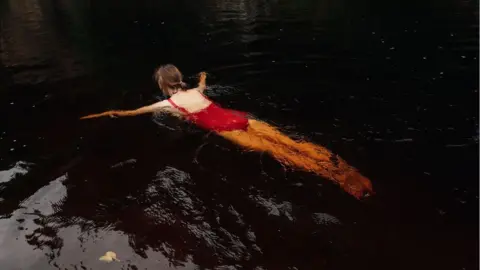'Time for change' in push for cleaner rivers
 Emma Stoner Photography
Emma Stoner PhotographyWhen Hannah Pearson saw some of her friends get ill after swimming in the River Dart, that was the spur to finding out what was going on in the water.
Now she is hoping four sites on the river will get designated bathing site status.
That will mean the water gets official testing during the summer which, she hopes, will lead to a cleaner river.
The River Dart cuts through some of the most picturesque parts of Devon, from Dartmoor to Dartmouth.
"I know how much benefit personally I get from swimming in the river every day," said Ms Pearson from Friends of the Dart.
"It's an absolute delight and I think it's really important for people to have that access to nature and ease of connection with nature that doesn't cost anything."
She added: "But a couple of years ago, some swimming friends and I noticed that people were beginning to get ill from swimming in the river.
"And that prompted the question of what's happening, what's in the water that's causing this and we began to inquire and realised that there was no data available."

The group decided to apply for bathing water status at four sites on the river, as part of a campaign to improve the quality of the river water.
They have been working alongside landowners, councils and South West Water as well as campaign group Surfers Against Sewage, which is aiming to get 200 inland water sites designated as bathing sites by 2030.
The Department for Food, Environment and Rural Affairs (Defra) has a list of requirements to be met before designation can be granted, including surveys, public consultation, pictures showing numbers of swimmers and evidence of facilities such as toilets.
Only three rivers in England are Defra-approved bathing water sites:
- The River Wharf in Ilkley, Yorkshire
- Wolvercote Mill Stream, in Port Meadow, Oxford
- A section of the River Deben at Waldringfield, Suffolk
The Friends of the Dart are nevertheless hopeful the sites, at Steamer Quay in Totnes, Stoke Gabriel, Dittisham and Warfleet will be approved.
"We have far exceeded the numbers needed," said Ms Pearson.
"We've had thousands and thousands of letters of support from local businesses and have the whole council team on board. We couldn't have done anything more."

 Emily Woodley
Emily WoodleyDesignated bathing water status
Anyone can apply to the Defra to designate or de-designate a bathing water.
If a site is designated, the Environment Agency will monitor water quality weekly during the bathing season from 15 May to 30 September to protect the health of people bathing.
There are 424 bathing waters across England, most of them are coastal beaches.
The criteria to be designated as a bathing water include:
- 100 bathers a day during bathing season with user surveys on two days to provide evidence
- Infrastructure or facilities such as toilets are provided nearby
- A letter of support for designation from the local authority (and each landowner, if the land is privately owned)
Groups have until the end of October to submit their applications this year, with results expected by 30 April 2024.
Source: Defra

Coastguards Beach on the River Erme in south Devon is also a picturesque spot that, along with nearby Mothecombe Beach attracts hundreds of visitors in the summer.
And yet, while Mothecombe is a designated bathing site with testing, Coastguards is not.
Campaigner Emily Woodley said: "I would love to be able to swim here without the fear of lots of things in the water.
"This beach is used by so many people... but we know that there are four sewage treatment works on the river and there is a lot of agricultural land.
"Ivybridge upstream is one of the fastest growing towns in Europe.
"Everything that comes down the river comes through here."
She added: "For me the key thing was trying to find out what we could do about it.
"So looking at bathing water designation is the only, as far as I can see, legislative thing that we can do."

What gets tested at designated sites?
The Environment Agency monitors levels of E. coli and intestinal enterococci at designated bathing waters.
They also look for indications of cyanobacteria, macro-algae, marine phytoplankton and waste.
The Environment Agency classifies designated bathing waters every year as excellent, good, sufficient or poor.
Source: Defra

Nicola Rogers, of the West Country Rivers Trust, said it backed applications that did not affect wildlife or the riverbank.
She said: "I think in the right place and with the legal approval for access with the landowner it can be a good thing, but we always have to bear in mind the ecological health of the river and large numbers of people accessing a site; just because it's accessible doesn't necessarily mean it's appropriate."
 Emma Stoner Photography
Emma Stoner PhotographyAll four of the proposed Dart sites ticked the boxes for the trust, she said.
"I think that Friends of the Dart has done an amazing job in getting the local community, local businesses, all sorts of people to engage.
"They're really keen on promoting the ecological health of the river as well as people's access to the river.
"It means people are more engaged with their river and so they become more involved and aware of how we need to look after and protect our rivers."
A Defra spokesperson said: "We encourage applications and provide guidance to help people understand the criteria that must be met."
South West Water said it was running pilot schemes on the Dart and River Tavy on the Devon and Cornwall boundary to "identify what may be required to work with others to achieve designated bathing water status".
It added that agricultural and urban run-off also affected water quality and its operations were only responsible for 12% of the reasons why rivers do not achieve Good ecological status in the region.
"We are investing significantly to reduce our impact on rivers by one-third by 2025, as we look to ensure we are not the reason for any river failing to meet ecological standards by 2030," it said.

Follow BBC News South West on Twitter, Facebook and Instagram. Send your story ideas to [email protected].
